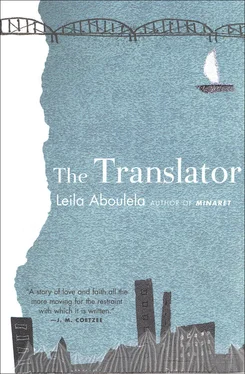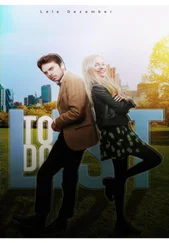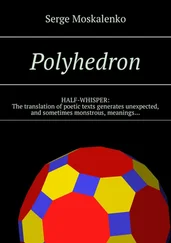She sat down on the suitcase. Four months ago, that was what Fareed had written, Rae had become a Muslim, he had said the shahadah in Fareed’s house in Stirling. Why didn’t Rae tell her before, why wait four months? To be sure, to make sure that he wouldn’t go back on this. He was cautious like that. And now asking… It made her smile. She had an airmail letter pad with her, a ball-point pen, two envelopes. She was going to write two letters in two languages. They would say the same thing but not be a translation. She wrote to Fareed first: long and cordial paragraphs, greetings, hoping that his wife and children were well, in good health. When she finished, she folded up the papers, put them in an envelope, wrote out an address in Stirling.
She wrote to Rae. One transparent sheet of airmail paper, a few lines. On the envelope she wrote Aberdeen, Scotland.
Television music came into the room, the voices of Me And Mama And Travolta. She unzipped the suitcase and looked at her winter clothes. She unfolded wool and out came the smell of winter and European clouds. She put on her gloves and then took them off, saw her tights, for a year she hadn’t worn tights. Her henna-coloured duffle coat, its silky lining. She would wear it again when she went back to Aberdeen, the toggles instead of buttons… In one of the pockets, she found the bottle of perfume, oval shaped, amber coloured. She opened it and breathed in, forgot the dust and the smell of dried beans and rice. She ran her fingers over a scarf that was too warm for wearing in Khartoum, its pattern of brown leaves.
Tomorrow, early in the morning she would go to the post office. She would buy stamps. The stamps would be full of colours. A map of the Sudan or jungle animals: an elephant, a rhino, a hippopotamus. She would hold the letters in her hand and in the sunlight stand in front of the post box. Hesitate a little before dropping them in. Then live day after day, get involved in the preparations for Nahla’s wedding, and wait. Wait. She had written to Rae, Please come and see me. Please. Here is where I am…
Two weeks later when she dragged open the gate and saw him, they both laughed as if everything was funny. And she was not as shy as she thought she would be, not awkward. He looked older than she remembered and younger too. More white in his hair but looking young because he had travelled a long way and was not diminished or fatigued. He said, ‘I’ve spent all day searching for the house,’ and that was funny too. All day searching for the house, her house. All day looking for her and she was not hiding, not masking herself, she was wanting to be found. There were lots of questions for her to ask: what made him lose his way, where was he staying, but they all seemed not to matter, not to be urgent in any way. Just the present, the black metal gate under her hand, warm and streaked by sunlight, dragging it closed again. Their footsteps on the cement of the car-port, their clothes brushing the dust on Hanan’s car. They stepped over Amir’s bicycle, lying on the steps to the garden. She looked at him and the sun hurt her eyes because she had rushed at the sound of the bell, afraid everyone would wake up and she had forgotten her sunglasses inside.
This was not the usual time for the door bell to ring and bring in visitors. It was after lunch, when the shadow of everything was equal to its height, and she had left everyone asleep, even the children. ‘Sleep or else you won’t go to Nahla’s wedding tonight,’ she had threatened them and eventually they had fallen asleep.
She had to leave Rae and go indoors to fetch cushions for the garden chairs, a tablecloth. She had to move carefully so as not to wake anyone up. In the kitchen she hesitated, Pepsi or Miranda? Which would he like more, she should have asked, now she had to guess. Pepsi from the fridge. Ice cubes and she must not make a noise when twisting the ice tray over the sink. Standing in the kitchen with the tap running over the ice, thinking of the next step, a glass, a tray, carrying the ice outside… This was abundance after the meagre time, the scratchy, meager time.
In the garden it was easy to talk. Pour the Pepsi into the glass and watch it froth, tiny sprays over the table cloth, then how it effervesced. Talk of the wobbly table, of the cooperative across the road, of Diane’s now completed thesis.
Mhairi fell off her horse but she was alright, though she got a scare. He talked about his new students, where they came from, what they were working on. ‘I am writing a textbook,’ he said, ‘an introduction to the politics of North Africa. I’ve decided it’s time for me to write a textbook and not concentrate so much on analysing current affairs.’
He drank his Pepsi and the ice cubes started to melt, their edges smooth and light. ‘Is this what you do here,’ he said, ‘offer guests drinks as soon as they come in and not have anything yourself?’
She smiled and nodded, that was the custom, yes. ‘Which airplane did you come on?’
‘KLM. I changed planes in Amsterdam. Aberdeen, Amsterdam, then we landed in Cairo on the way, transit for about an hour. I got here at two in the morning.’ He smiled and looked at her, ‘You were asleep then.’
Two o’clock in the morning she was fast asleep, not hearing the plane that landed in the airport nearby. But later at dawn she had heard the azan and got up to pray. Another dawn, asking for forgiveness, saying there is no will or strength except from Allah, and not knowing, having no idea what the day ahead held out for her.
‘Was it alright at the airport?’ Sometimes foreigners were given a hard time, their baggage thoroughly and slowly searched, a lot of questions asked.
‘Fine, no problems. The conveyer belt wasn’t working so it took ages for the luggage to come out but it was okay at the end. It was the smoothest trip I have ever done… It must be because my intention is good.’
She smiled and they were quiet for a time. He held the glass in his right hand, as much ice now as Pepsi.
‘Why did you tell Fareed to write to me, why didn’t you write to me?’ She asked without complaint, without reproach. Fareed’s letter had been useful: formal, correct, what she needed. She had been able to show it to Waleed and Hanan and say to them, ‘You must speak to Mahasen, you must tell her because it would be easier for her if she hears from you.’
‘I wanted to do everything properly,’ Rae said. ‘I was afraid you were married. I would have deserved that…’
‘No. No, our next door neighbour is getting married.’ She still said silly things, unconnected things.
‘What’s her name?’
‘Nahla.’ It occurred to her that Nahla was a beautiful name. And it was beautiful that she lived next door and tonight was her wedding. The wide outdoor space of the Syrian club, noisy music and a light wind, everyone wearing cardigans over their best clothes. Rae could go too. She would introduce him to Waleed and everyone she knew.
‘And Nahla is your friend?’
‘Yes, though she is much younger than me. And she is going to Qatar where Yasmin is.’
‘Is Qatar a place you would like to visit?’
‘Someday yes.’
Beaming, that was how she was, all over him. She should reproach him for the past, discuss with him practical things. Where was her brain? Yellow grass and the trees untrimmed, a smell she knew, of jasmine and mud.
‘I think,’ he said, ‘we should not prolong this torture.’
‘What torture?’
He laughed and wiped his face with his hand. Torture for her were the days when she heard a worldly, logical voice saying, someone like him will never become a Muslim. The voice measured the distance between them, it calculated the probability that he was with someone else, a woman with lighter eyes, a lighter heart…
Читать дальше












